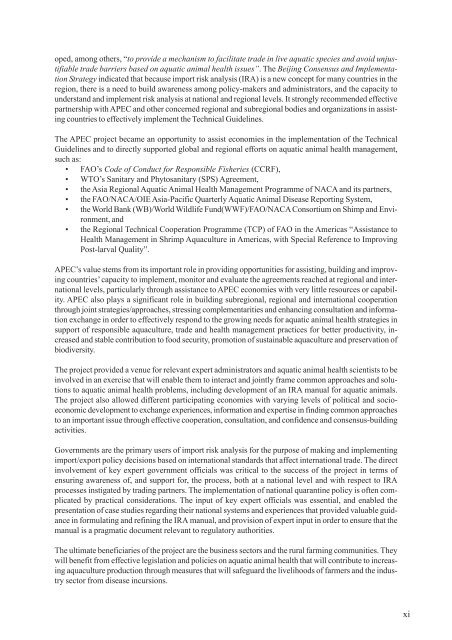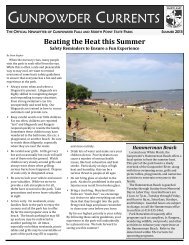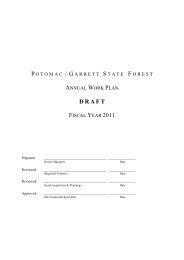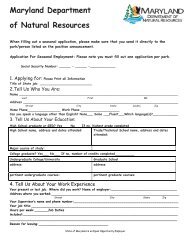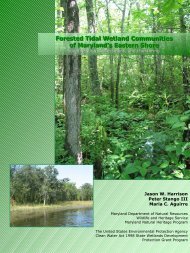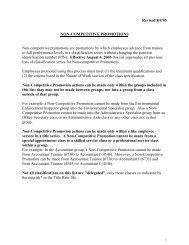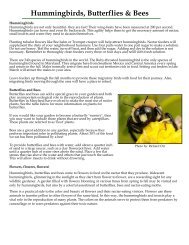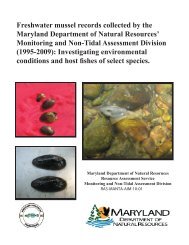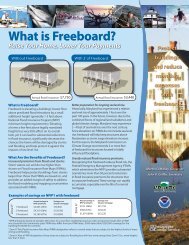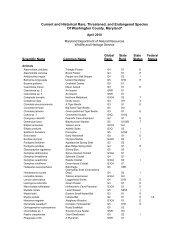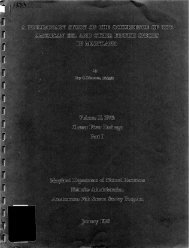NAca Section 2.pmd - Maryland Department of Natural Resources
NAca Section 2.pmd - Maryland Department of Natural Resources
NAca Section 2.pmd - Maryland Department of Natural Resources
Create successful ePaper yourself
Turn your PDF publications into a flip-book with our unique Google optimized e-Paper software.
oped, among others, “to provide a mechanism to facilitate trade in live aquatic species and avoid unjustifiable<br />
trade barriers based on aquatic animal health issues”. The Beijing Consensus and Implementation<br />
Strategy indicated that because import risk analysis (IRA) is a new concept for many countries in the<br />
region, there is a need to build awareness among policy-makers and administrators, and the capacity to<br />
understand and implement risk analysis at national and regional levels. It strongly recommended effective<br />
partnership with APEC and other concerned regional and subregional bodies and organizations in assisting<br />
countries to effectively implement the Technical Guidelines.<br />
The APEC project became an opportunity to assist economies in the implementation <strong>of</strong> the Technical<br />
Guidelines and to directly supported global and regional efforts on aquatic animal health management,<br />
such as:<br />
• FAO’s Code <strong>of</strong> Conduct for Responsible Fisheries (CCRF),<br />
• WTO’s Sanitary and Phytosanitary (SPS) Agreement,<br />
• the Asia Regional Aquatic Animal Health Management Programme <strong>of</strong> NACA and its partners,<br />
• the FAO/NACA/OIE Asia-Pacific Quarterly Aquatic Animal Disease Reporting System,<br />
• the World Bank (WB)/World Wildlife Fund(WWF)/FAO/NACA Consortium on Shimp and Environment,<br />
and<br />
• the Regional Technical Cooperation Programme (TCP) <strong>of</strong> FAO in the Americas “Assistance to<br />
Health Management in Shrimp Aquaculture in Americas, with Special Reference to Improving<br />
Post-larval Quality”.<br />
APEC’s value stems from its important role in providing opportunities for assisting, building and improving<br />
countries’ capacity to implement, monitor and evaluate the agreements reached at regional and international<br />
levels, particularly through assistance to APEC economies with very little resources or capability.<br />
APEC also plays a significant role in building subregional, regional and international cooperation<br />
through joint strategies/approaches, stressing complementarities and enhancing consultation and information<br />
exchange in order to effectively respond to the growing needs for aquatic animal health strategies in<br />
support <strong>of</strong> responsible aquaculture, trade and health management practices for better productivity, increased<br />
and stable contribution to food security, promotion <strong>of</strong> sustainable aquaculture and preservation <strong>of</strong><br />
biodiversity.<br />
The project provided a venue for relevant expert administrators and aquatic animal health scientists to be<br />
involved in an exercise that will enable them to interact and jointly frame common approaches and solutions<br />
to aquatic animal health problems, including development <strong>of</strong> an IRA manual for aquatic animals.<br />
The project also allowed different participating economies with varying levels <strong>of</strong> political and socioeconomic<br />
development to exchange experiences, information and expertise in finding common approaches<br />
to an important issue through effective cooperation, consultation, and confidence and consensus-building<br />
activities.<br />
Governments are the primary users <strong>of</strong> import risk analysis for the purpose <strong>of</strong> making and implementing<br />
import/export policy decisions based on international standards that affect international trade. The direct<br />
involvement <strong>of</strong> key expert government <strong>of</strong>ficials was critical to the success <strong>of</strong> the project in terms <strong>of</strong><br />
ensuring awareness <strong>of</strong>, and support for, the process, both at a national level and with respect to IRA<br />
processes instigated by trading partners. The implementation <strong>of</strong> national quarantine policy is <strong>of</strong>ten complicated<br />
by practical considerations. The input <strong>of</strong> key expert <strong>of</strong>ficials was essential, and enabled the<br />
presentation <strong>of</strong> case studies regarding their national systems and experiences that provided valuable guidance<br />
in formulating and refining the IRA manual, and provision <strong>of</strong> expert input in order to ensure that the<br />
manual is a pragmatic document relevant to regulatory authorities.<br />
The ultimate beneficiaries <strong>of</strong> the project are the business sectors and the rural farming communities. They<br />
will benefit from effective legislation and policies on aquatic animal health that will contribute to increasing<br />
aquaculture production through measures that will safeguard the livelihoods <strong>of</strong> farmers and the industry<br />
sector from disease incursions.<br />
xi


